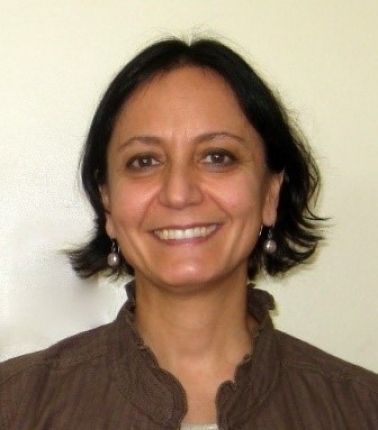
Departmental Affiliations
Center & Institute Affiliations
Elli Leontsini, MD, MPH ‘88 specializes in the design of feasible and sustainable behavioral and community-centered vector control and hygiene strategies internationally.
Contact Info
615 N. Wolfe Street, Room E5032
Baltimore
Maryland
21205
US
410 502 6733
Research Interests
formative research; operations research; implementation research; design research; survey methods; ethnographic research methods; qualitative research methods; behavioral trials; trials of improved practices; human-centered design; social entomology; program evaluation methods; social media listening;
community-based interventions; community participation; health education; health communication; health-seeking behavior; health behavior change; evaluation of school-based programs; evaluation of children's museum exhibits; process evaluation;
vector-borne disease; mosquito-borne disease; tropical disease; Aedes aegypti; dengue fever; Zika Virus Disease (ZVD); malaria; cysticercosis; Lyme disease; diarrheal disease; Ebola Virus Disease (EVD); Corona Virus Disease 2019 (COVID-19); early child development; child survival; integrated management of childhood illness (IMCI); water, sanitation, and hygiene (WASH); opioid overuse recovery services;
Central America; Honduras; El Salvador; Guatemala; Nicaragua; Puerto Rico; Dominican Republic; Peru; Brazil; Cambodia; Tanzania; Zimbabwe; Uganda; Liberia; Bangladesh; Equatorial Guinea; Democratic Republic of Congo
Experiences & Accomplishments
Education
MPH
Johns Hopkins Bloomberg School of Public Health
1988
MD
National and Capodistrian University School of Medicine
1983
Overview
I am a public health professor and researcher with a long-term presence in international health. I specialize in formative and qualitative research for the design of feasible and sustainable behavioral and community-centered public health strategies; and in process and impact evaluation of resulting social and behavioral interventions. The impact of my collaborative work, added to that of my collaborators, has been primarily in vector control and hygiene interventions in Latin America, the Caribbean, and in Bangladesh. I teach and co-teach the formative research and human-centered design courses at the School.
Honors & Awards
2018, 2017, 2015, 2009 Teaching Excellence mention by JHSPH Deans for Program Seminar 224.861 based on students’
course evaluations
2013 Excellence in Global Health Advising Award. Presented on behalf of JHU President Ronald J. Daniels,
Johns Hopkins Center for Global Health, April 2013
2013 Teaching Excellence mention by JHSPH Deans for Formative Research Course 224.692 based on students’
course evaluations
2003 The James H. Nakano Citation of the Centers of Disease Control and Prevention, Atlanta, Georgia, for an
outstanding scientific paper: by Winch PJ, Leontsini E, Rigau-Perez JG, Ruiz-Perez M, Clark GG and
Gubler DJ. Community-based dengue prevention programs in Puerto Rico: Impact on knowledge, behavior and
residential mosquito infestation. American Journal of Tropical Medicine and Hygiene 67(4):363-370, 2002.
course evaluations
2013 Excellence in Global Health Advising Award. Presented on behalf of JHU President Ronald J. Daniels,
Johns Hopkins Center for Global Health, April 2013
2013 Teaching Excellence mention by JHSPH Deans for Formative Research Course 224.692 based on students’
course evaluations
2003 The James H. Nakano Citation of the Centers of Disease Control and Prevention, Atlanta, Georgia, for an
outstanding scientific paper: by Winch PJ, Leontsini E, Rigau-Perez JG, Ruiz-Perez M, Clark GG and
Gubler DJ. Community-based dengue prevention programs in Puerto Rico: Impact on knowledge, behavior and
residential mosquito infestation. American Journal of Tropical Medicine and Hygiene 67(4):363-370, 2002.
Select Publications
Selected publications illustrating some of my collaborative contributions to public health (* indicates a mentored student or post-doctoral fellow):
- Rothstein JD, Buckland AJ, Gagnier K, Ochoa MP, Allen-Valley A*, Jivapong B*, Cabrera, LZ, Leontsini, E, Fisher, K. Assessing the play and learning environments of children under two years in peri- urban Lima, Peru: A formative research study. BMC Public Health 21,108 (2021)
- Leontsini E, Maloney S, Ramírez M, Rodriguez E*, Gurman T, Ballard Sara A, Hunter GC. A qualitative study of community perspectives surrounding cleaning practices in the context of Zika prevention in El Salvador: implications for community-based Aedes aegypti control. BMC Public Health 20(1):1385 (2020)
- Parvez SM, Azad R, Rahman MM, Unicomb L, Ram PK, Naser AM, Stewart C, Jannat K, Rahman MJ, Leontsini E, Winch PJ, Luby SP. Achieving optimal technology and behavioral uptake of single and combined interventions of water, sanitation hygiene and nutrition, in an efficacy trial (WASH Benefits) in rural Bangladesh. Trials (2018) 19:358
- Hulland KRS*, Leontsini E, Dreibelbis R, Unicomb L, Afroz A, Dutta NC, Nizame FA, Luby SP, Ram PK, Winch PJ. Designing a handwashing station for infrastructure-restricted communities in Bangladesh using the integrated behavioural model for water, sanitation and hygiene interventions (IBM-WASH). BMC Public Health 2013, 13:877
- Charron K, Kalbarczyk A, Martin NA, Combs EA, Ward M and Leontsini E. Building Blocks of Global Health Mentorship: Motivation, Expectations, and Institutional Support. Annals of Global Health. 2019; 85(1): 39, 1–9
Projects
Social and behavioral aspects of taenia solium and cysticercosis control in rural endemic Peru
Improving Early Child Development through the Integration of Safe Play and Song-Based Learning in peri-urban Lima, Peru
Designing and evaluating scalable integrated WASH and maternal and child health interventions in rural Bangladesh
Qualitative evaluation of the implementation dimension of the Pennsylvania Hospitals Opioid Learning Action Network
Developing a productive experience for public health students overseas
Community perspectives in response to Zika prevention in Guatemala, El Salvador and the Dominican Republic
